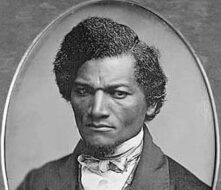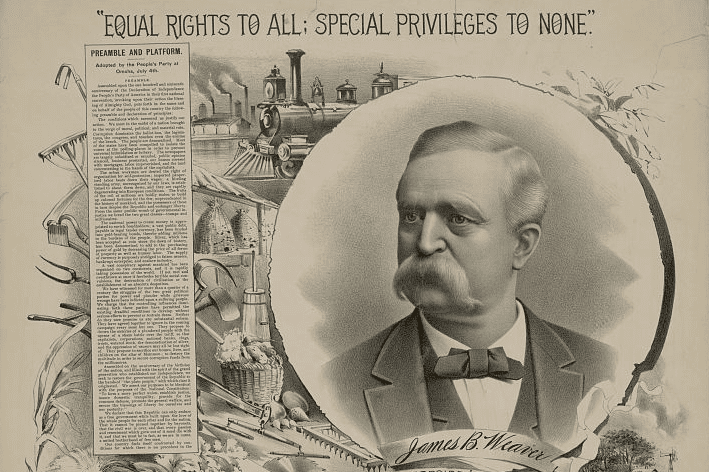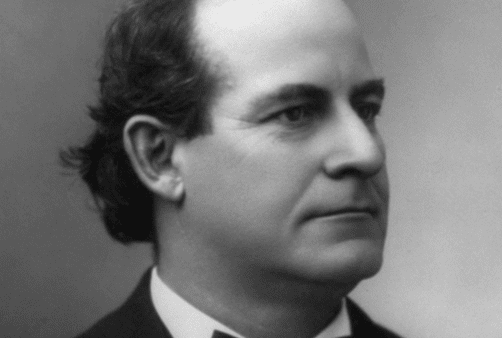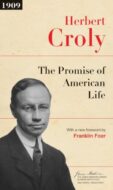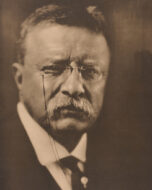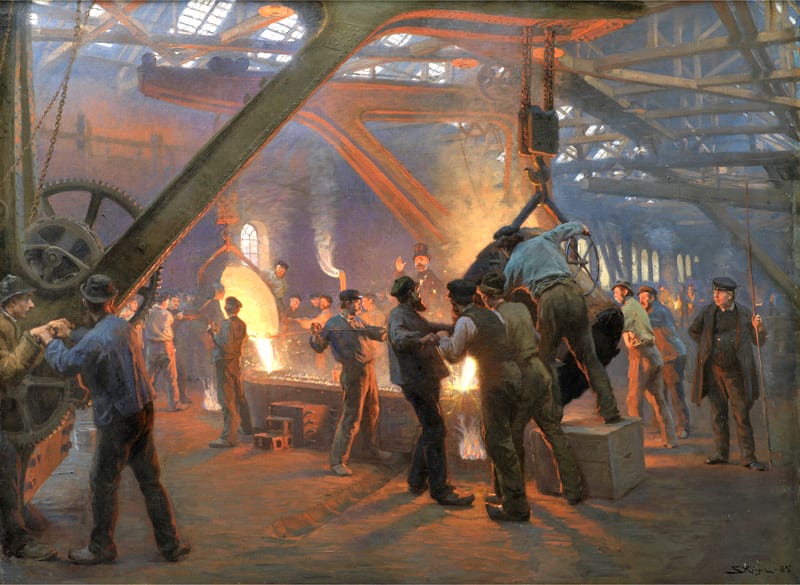
Introduction
The Populists had emerged as a viable third party in the 1890 midterm elections when they captured nine congressional seats and won impressive victories in state and local politics. In general, the Populists reflected a growing consensus among farmers that national policies favored industrial development at the expense of agrarian concerns, and that the major parties had abandoned the interests of small farmers. Republicans were immediately targeted for their support of the “moneyed” power in the Northeast, but Democrats in the South were also put on notice as small farmers in the South chafed under patrician rule. The Populists wished to guarantee farm income through certain kinds of government regulations. More importantly, Populists began to insist on free silver and monetary inflation as a way to relieve heavy mortgage burdens.
As the party met in Omaha to launch its first national campaign for the presidency, delegates disagreed on tactics and demands but were united in their enthusiasm and desire for reform. The platform was a mixture of altruism and practical politics, displaying a desire to win combined with hope for a better future. Though their presidential aspirations were unsuccessful, the Populists set the stage for the candidacy of William Jennings Bryan in 1896.
Source: Populist Party Platform 1892, July 4, 1892. Online by Gerhard Peters and John T. Woolley, The American Presidency Project. https://www.presidency.ucsb.edu/node/273285
Assembled upon the 116th anniversary of the Declaration of Independence, the People’s Party[1] of America, in their first national convention, invoking upon their action the blessing of Almighty God, put forth in the name and on behalf of the people of this country, the following preamble and declaration of principles:
PREAMBLE.
The conditions which surround us best justify our co-operation; we meet in the midst of a nation brought to the verge of moral, political, and material ruin. Corruption dominates the ballot-box, the Legislatures, the Congress, and touches even the ermine[2] of the bench. The people are demoralized; most of the States have been compelled to isolate the voters at the polling places to prevent universal intimidation and bribery. The newspapers are largely subsidized or muzzled, public opinion silenced, business prostrated, homes covered with mortgages, labor impoverished, and the land concentrating in the hands of capitalists. The urban workmen are denied the right to organize for self-protection, imported pauperized labor beats down their wages, a hireling standing army, unrecognized by our laws, is established to shoot them down, and they are rapidly degenerating into European conditions.[3] The fruits of the toil of millions are boldly stolen to build up colossal fortunes for a few, unprecedented in the history of mankind; and the possessors of those, in turn, despise the Republic and endanger liberty. From the same prolific womb of governmental injustice we breed the two great classes—tramps and millionaires.
The national power to create money is appropriated to enrich bondholders; a vast public debt payable in legal tender currency has been funded into gold-bearing bonds, thereby adding millions to the burdens of the people.
Silver, which has been accepted as coin since the dawn of history, has been demonetized to add to the purchasing power of gold by decreasing the value of all forms of property as well as human labor, and the supply of currency is purposely abridged to fatten usurers, bankrupt enterprise, and enslave industry.[4] A vast conspiracy against mankind has been organized on two continents, and it is rapidly taking possession of the world. If not met and overthrown at once it forebodes terrible social convulsions, the destruction of civilization, or the establishment of an absolute despotism.
We have witnessed for more than a quarter of a century the struggles of the two great political parties for power and plunder, while grievous wrongs have been inflicted upon the suffering people. We charge that the controlling influences dominating both these parties have permitted the existing dreadful conditions to develop without serious effort to prevent or restrain them. Neither do they now promise us any substantial reform. They have agreed together to ignore, in the coming campaign, every issue but one. They propose to drown the outcries of a plundered people with the uproar of a sham battle over the tariff, so that capitalists, corporations, national banks, rings, trusts, watered stock, the demonetization of silver and the oppressions of the usurers may all be lost sight of. They propose to sacrifice our homes, lives, and children on the altar of mammon;[5] to destroy the multitude in order to secure corruption funds from the millionaires.
Assembled on the anniversary of the birthday of the nation, and filled with the spirit of the grand general and chief who established our independence, we seek to restore the government of the Republic to the hands of “the plain people,” with which class it originated. We assert our purposes to be identical with the purposes of the National Constitution; to form a more perfect union and establish justice, insure domestic tranquility, provide for the common defence, promote the general welfare, and secure the blessings of liberty for ourselves and our posterity.
We declare that this Republic can only endure as a free government while built upon the love of the whole people for each other and for the nation; that it cannot be pinned together by bayonets; that the Civil War is over, and that every passion and resentment which grew out of it must die with it, and that we must be in fact, as we are in name, one united brotherhood of free men.
Our country finds itself confronted by conditions for which there is no precedent in the history of the world; our annual agricultural productions amount to billions of dollars in value, which must, within a few weeks or months, be exchanged for billions of dollars’ worth of commodities consumed in their production; the existing currency supply is wholly inadequate to make this exchange; the results are falling prices, the formation of combines and rings, the impoverishment of the producing class. We pledge ourselves that if given power we will labor to correct these evils by wise and reasonable legislation, in accordance with the terms of our platform.
We believe that the power of government—in other words, of the people—should be expanded (as in the case of the postal service) as rapidly and as far as the good sense of an intelligent people and the teachings of experience shall justify, to the end that oppression, injustice, and poverty shall eventually cease in the land.
While our sympathies as a party of reform are naturally upon the side of every proposition which will tend to make men intelligent, virtuous, and temperate, we nevertheless regard these questions, important as they are, as secondary to the great issues now pressing for solution, and upon which not only our individual prosperity but the very existence of free institutions depend; and we ask all men to first help us to determine whether we are to have a republic to administer before we differ as to the conditions upon which it is to be administered, believing that the forces of reform this day organized will never cease to move forward until every wrong is remedied and equal rights and equal privileges securely established for all the men and women of this country.
PLATFORM.
We declare, therefore—
First.—That the union of the labor forces of the United States this day consummated shall be permanent and perpetual; may its spirit enter into all hearts for the salvation of the Republic and the uplifting of mankind.
Second.—Wealth belongs to him who creates it, and every dollar taken from industry without an equivalent is robbery. “If any will not work, neither shall he eat.”[6] The interest of rural and civic[7] labor are the same; their enemies are identical.
Third.—We believe that the time has come when the railroad corporations will either own the people or the people must own the railroads, and should the government enter upon the work of owning and managing all railroads, we should favor an amendment to the Constitution by which all persons engaged in the government service shall be placed under a civil-service regulation of the most rigid character, so as to prevent the increase of the power of the national administration by the use of such additional government employees.
Finance.—We demand a national currency, safe, sound, and flexible, issued by the general government only, a full legal tender for all debts, public and private, and that without the use of banking corporations, a just, equitable, and efficient means of distribution direct to the people, at a tax not to exceed 2 per cent. per annum, to be provided as set forth in the sub-treasury plan of the Farmers’ Alliance,[8] or a better system; also by payments in discharge of its obligations for public improvements.
- We demand free and unlimited coinage of silver and gold at the present legal ratio of 16 to 1.
- We demand that the amount of circulating medium be speedily increased to not less than $50 per capita.
- We demand a graduated income tax.
- We believe that the money of the country should be kept as much as possible in the hands of the people, and hence we demand that all State and national revenues shall be limited to the necessary expenses of the government, economically and honestly administered.
- We demand that postal savings banks be established by the government for the safe deposit of the earnings of the people and to facilitate exchange.
Transportation.—Transportation being a means of exchange and a public necessity, the government should own and operate the railroads in the interest of the people. The telegraph, telephone, like the post-office system, being a necessity for the transmission of news, should be owned and operated by the government in the interest of the people.
Land.—The land, including all the natural sources of wealth, is the heritage of the people, and should not be monopolized for speculative purposes, and alien ownership of land[9] should be prohibited. All land now held by railroads and other corporations in excess of their actual needs, and all lands now owned by aliens should be reclaimed by the government and held for actual settlers only.
- 1. The People’s Party was the initial name given to the movement; later, the party changed its name to the Populist Party, a term coined by a writer for an Ohio newspaper.
- 2. Ermine are weasels whose white fur and black-tipped tails have traditionally been used to trim the edges of the ceremonial cloaks worn by certain European judges. American justices since at least the time of John Marshall have eschewed such finery (wearing plain black robes), so this reference is clearly meant not as a factual description of the justices’ attire, but rather as a critique of the elitist nature of the judiciary as an institution.
- 3. The reference here is likely to the fact that agriculture no longer dominated European economies and had been far eclipsed by manufacturing.
- 4. This is the influence of what the Populists referred to as the “money power” that took the form of Eastern banks and industrial monopolies. These groups financed farmers’ mortgages, determined the rates railroads charged to carry their produce to market, and then played a major role in setting the prices for their products. When times were good, the money power took an unfair share of farmers’ profits; when times were bad, the money power took farmers’ homes.
- 5. The name of the devil of greed in Milton; more generally, a reference to wealth regarded as an evil influence or as an idol.
- 6. This quote, from the Bible, is attributed to Paul the Apostle (II Thessalonians 3:10).
- 7. Industrial.
- 8. Farmers’ Alliances were the early incarnation of the Populists. First organized in Texas in 1878, they became conduits for early political action to address later Populist concerns.
- 9. An alien is a foreign national.

Conversation-based seminars for collegial PD, one-day and multi-day seminars, graduate credit seminars (MA degree), online and in-person.


















